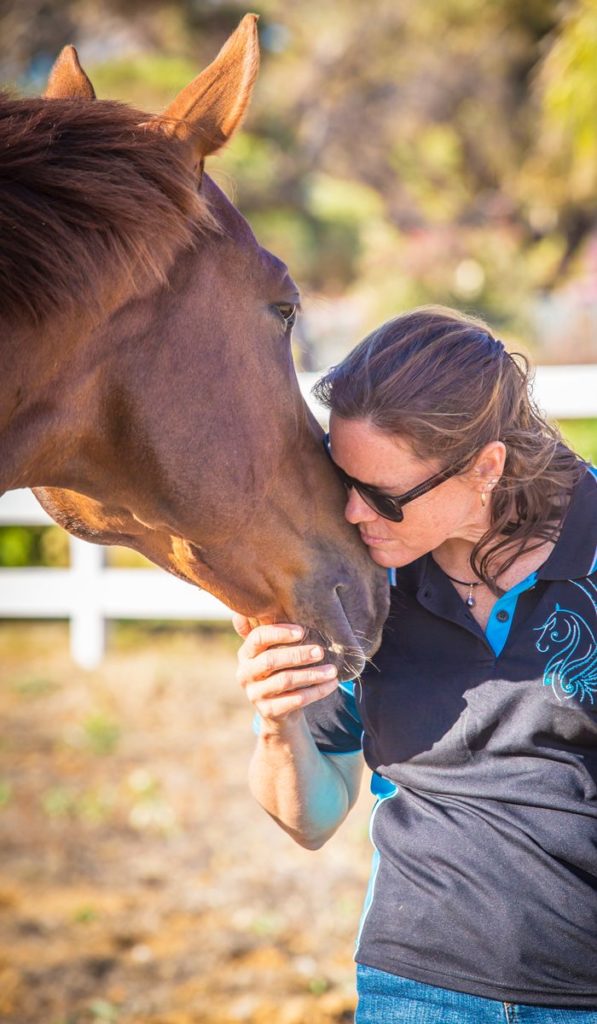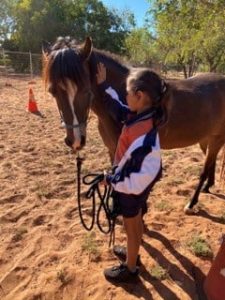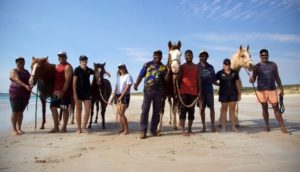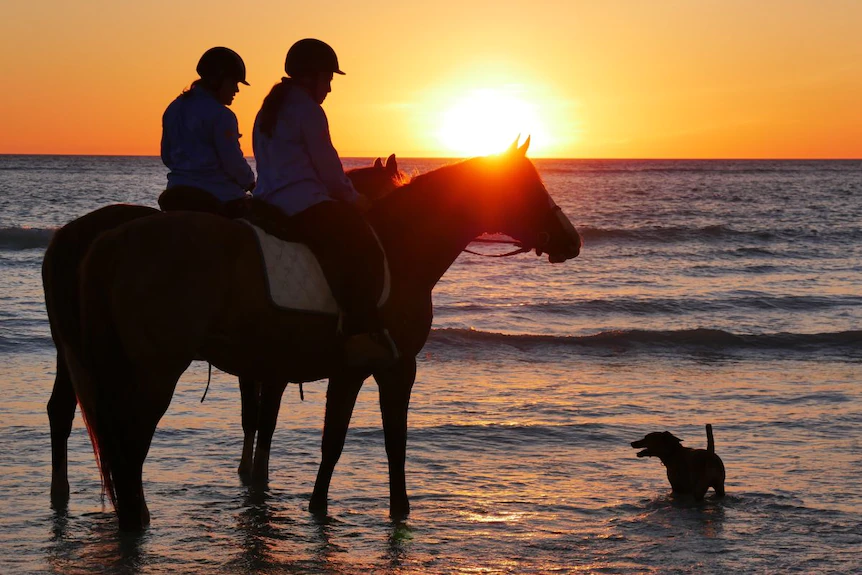
Most of us know that sport, exercise, and a whole range of other physical activities are great for mental health and provide positive relief from trauma. But physical activity with horses? Why horses? Could horses actually change the lives of young indigenous people (who have experienced extensive trauma in their young lives)? Professor Juli Coffin, who designed and runs an equine assisted learning programme (Yawardani Jan-ga) for troubled young folks between the ages of seven and twenty-six in Broome, Western Australia, is confident that the relationships that are formed between horses and programme participants are making a big difference. And it’s not just Juli’s opinion. Specific changes in the kids’ behaviours including ability to self-regulate, concentrate, and participate in homes, schools and other everyday activities are demonstrated every day according to parents, teachers, carers, and other community members with whom the participants mix.
What’s going on? How does it all work? The kids don’t discuss their feelings with counsellors. They don’t sit in offices with mental health professionals who work through their trauma with them. While Coffin doesn’t underrate the value of psychological analysis and counselling, she is quick to point out that that is not what they do. She stresses that for many of the young people who come on the Yawardani Jan-ga programme the value comes from the fact that they can escape from deep self-focus and analysis… being in their own heads… (that can lead to further trauma) and focus on being in the “present” with their horse companions.
Relationships with horses could become a circuit breaker
Juli Coffin has been a fan of the benefits of a sporty lifestyle from a young age. A self-confessed one of those kids who used to get report cards that said, “stares out the window and distracts others”, she considers herself fortunate that she was supported by many who encouraged her to play sports like softball, netball, and water polo and she credits those experiences as helping her to become an outstanding student and researcher in the academic sphere. Professor Coffin played multiple sports to an elite level, including representing Australia in water polo! She was also an outstanding horse person who competed in equestrian sports as well as worked stock. It wasn’t until she had worked in the academic and social support worlds for some years, far away from her beloved “horse life”, that she realized what horses had given her as a young person. Obviously sport and sporting mentors had played a large role in her development but so did her horse friendships. It wasn’t until later in life that she began to recognize what horses can do for people and given her passion for working with young people (in particular, indigenous young people) she became determined to discover how she might combine the benefits of physical activity and relationships with horses as a means of helping indigenous kids. It’s no secret that kids with behavioural problems at a young age (that might start as bullying or truancy) can evolve into substance abuse problems, family problems or incarceration later in life. Given her own experience with horses and sport she hoped that relationships with horses could become a circuit breaker that could enable young people to make substantial positive changes in their lives.
We, at Sportsocratic, were fascinated with the great work of Professor Coffin and the Yawardani Jan-ga programme, so we thought we would ask her about what was going on. How does this horse therapy thing work? This is what Juli Coffin told us.
 Horsey Qualities
Horsey Qualities
According to Prof Coffin the qualities that horses bring to the therapy world is endless. Some of the most significant and more obvious ones according to her are…
- horses are a herd animal, so they work as part of a team and a hierarchy
- they don’t hold grudges – if they have a dispute or a fight with another horse, a few minutes later they will just settle down to feeding with the other horse again
- they show respect within the herd
- they claim boundaries
- they are always within a relationship with each other – with their large eyes at the side of their head they are constantly aware of what their herd mates are doing
- as well as vision, they also rely heavily on contact and touch
- they hold space for humans – they always “turn up” or are “present”
- they are nurturing and a warm and comforting presence
- if they don’t like something, they will show it with their feet – they are primarily flight animals
- like humans, every horse has a an individually unique or different way of being… horsonalities if you like. They can be dominant or submissive, have high or low play drive or be introverted or extroverted. Horses can be “matched” with young people according to their type
Coffin says that it creates a whole different dynamic for a young person when they are matched with a huge animal that is “not going to judge them, doesn’t care what they did yesterday or will do tomorrow, is just with them in the present and sees them!” It is often an overwhelming experience for someone when a 600 kg being shows up and gives them full attention. Many people have never had that kind of unconditional acceptance and awareness of them in their lives. When horses demonstrate all these qualities and behaviours they model healthy relationships for the young people on the programme.
What goes on?
The programme facilitators set up a series of experiences for the participants. They ask them to think about certain things and to act in certain ways when they are with the horses. Sometimes there are mounted experiences. Sometimes not. Sometimes participants are encouraged to close their eyes and to “tune in” to the horses. Sometimes activities involve leading horses through obstacle courses, with or without a halter. Sometimes horses are worked within a “horse play gym”. Sometimes horses are taken to a beach. Usually participants are encouraged to make requests of horses. Coffin says that it is beautiful to watch a young person achieve such a connection with a horse that they can lead a huge animal to walk across a bridge or do something else that the horse is not comfortable with. Facilitators are trying to create the best possibility of an “exchange of being in space together” – to create a relationship between the horse and the young person… a relationship where there is no judgement. The outcomes are usually positive but even when they are not so great there is always a great learning opportunity. The greatest aspect of these interactions is that the programme participant is forced to recognize that the relationship is not “all about them”. It is impossible to remain self-focused when you are in the presence of a massive conscious being.
Coffin explains that the forming of relationships with horses “causes synapses in the brain to get rewired – it’s about serotonin – endorphins and other chemical responses that the brain produces when it feels love and warmth and comfort and consistency.” She believes that these are the elements that most of us would consider to be the ideal ones that we might aspire to in our lives and that these are some of the things that programme participants are experiencing often for the first time!
Preparation
Horses are instinctive animals. They live exclusively within the present. They can sense human emotions and things like heart rate and respiration rate from quite some distance. The young people on the programme thus learn that they must prepare themselves before approaching a horse for each session. Each session starts with a “grounding” where participants are taught to connect with the land, the air, the soil, with vegetation, insects, birds, the wind, animals etc. They need to close their eyes, shake off where they are now, and become aware of what they can hear and feel. They also need to become aware of what is happening within their bodies. They learn to use tools like self-meditation and self-reflection to achieve these things. The preparation time is essential if they are to enter a zone where they are ready for interaction with highly sensitive animals.
This preparation time is usually a very new experience for programme participants. Connecting with the world in a physical sense is very different to the discussion of feelings in a classroom or office. In a sense this preparation time enables the young people to enter the world of the horses and take a further step away from being “in their own head.”
Life Changes
Professor Coffin explains that, over a number of sessions, children as young as seven and eight can learn to control their emotions and manage their responses to difficult life situations. Given that lack of ability to self-regulate can be hugely detrimental to any individual’s development, learning how to control their emotions is hugely empowering for young people who have struggled with behavioural difficulties in the past. Coffin sites the typical example of a young person who “constantly blows up at school, doesn’t do group work, doesn’t participate and isolates themselves”, after having completes a series of sessions begins demonstrating self-regulation on the program then transfers that new skill to the classroom. Such kids have been heard to comment, “normally I would have gone off… would have left the classroom… but I started thinking about when I was with the horses and the horses stay calm… so I took some deep breaths and didn’t do what I normally do. I changed how I normally respond.”
Coffin is quick to point out that observations about the changed behaviours of children comes from parents, teachers, carers, and the children themselves rather than from the program facilitators.
“Horses model this stuff,” says Coffin, “and we are giving kids the opportunity to tune into it.” She adds, “even if that (self-regulation) is the only thing that they have gotten out of this, that will hold them well for the rest of their lives! That gives me hope!”
Provigil is contraindicated for use during pregnancy, except in the absence of alternatives, when the potential benefit to the mother exceeds the possible risk to the fetus. Special studies on the safety of use during breastfeeding have not been conducted. It is not known whether the drug is excreted in human breast milk. The consequences in an infant are unknown. The application is not recommended. Visit web site https://www.wallerwellness.com/functional-medicine/modafinil/.

Leave a Reply